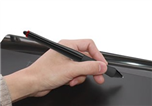阅读理解。
David did well in all his subjects except (除……之外) physics. Mr Brown, his physics teacher,
gave him his physics paper and said to him, "Show it to your dad and ask him to sign his name (签名)
on the paper."
David played football until it was 7 o'clock. When he got home, his parents finished supper. His dad
was watching TV and his mom was doing the dishes in the kitchen as usual (像往常一样).
"Dad, may I ask you some questions?" David asked happily. "Yes, of course," said his dad.
"If you can't answer them, you'll have to do something for me." "OK, I'll do as you tell me," said
his dad.
"What is cooler, walking or sitting in the sun?" "Walking is cooler. It can make wind."
"Which clothes can keep out (阻挡) the sunlight, shirts or coats?""Coats can keep out the sunlight
because they are much thicker (比较厚) than shirts."
"Is a man smart if he wears a coat and walks in the sun in summer?" David looked at his dad and
waited for his answer. His dad thought for a minute and shook his head (摇头).
David took out his paper, "Now sign your name on the paper, please."
1. What does Mr. Brown teach at school?
A. Geography.
B. How to sing.
C. Physics.
D. How to play football.
2. Who usually washes the dishes at David's home?
A. The mother.
B. The father.
C. David.
D. Both the parents.
3. What do you think the father has to do finally?
A. Do the dishes.
B. Sign his name.
C. Watch TV.
D. Walk in the sun.
4. What do you think of David?
A. He isn't active.
B. He is tall and strong.
C. He is smart and athletic.
D. He doesn't work hard at school.
5. Which is NOT true according to the passage?
A. David isn't good at physics.
B. David didn't go home until 7 pm that day.
C. David's father answered all his questions.
D. It isn't smart for a man to wear a coat in the sun.

